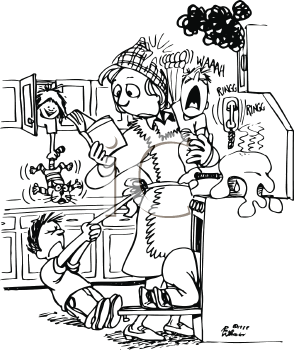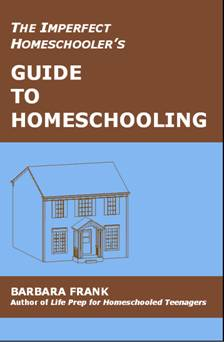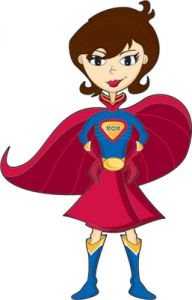I can feel my post-election depression finally lifting. This is a good thing. For a while I was having some pretty dark thoughts, things like “Why bother to homeschool our kids if they’re just going to become sheeple anyways? Why not send them to public school so the indoctrination can begin, making them more psychologically comfortable in the socialist society that lies ahead?” See what I mean about dark thoughts?
Not that I’ve changed my mind. I do think the results of November’s election showed that there are enough people looking for government to take care of them that we’re headed toward socialism. The numbers made it clear that we’re crossing the line from a majority of makers to a majority of takers.
One of my kids saw this mindset clearly exhibited during a recent stint at tech college (AKA in other states as community college or junior college.) Many fellow students shared stories of frustration at not finding enough sugared cereals at the local food bank, thus making government-issued EBT cards (formerly known as food stamps) a necessity. Then there were those who complained that their free government-sponsored daycare didn’t offer care on weekends so they could party without having to be home in time for the kids. But some still make it work: one student, in her 20s with three children by different fathers, bragged about a weekend in Las Vegas with her boyfriend….when the government pays for your food, housing, tuition and books, you can apparently afford such niceties.
So I pictured a country more than half-filled with people such as these, and I realized we were toast. All the things we’d taught our children (to be responsible for themselves, stay out of debt, put away money for a rainy day, make wise financial decisions) flew in the face of what’s been going on in our country.
Why be so conscientious when sloth is rewarded? Why raise kids to be financially independent and entrepreneurially minded if that will make them pariahs? After all, since our culture defines success as becoming wealthy, doing so will make you one of the hated 1% (unless you’re a rapper like Jay-Z, because wealthy rappers apparently get a pass). Who wants to insure that their kids become hated, even while they support the rest of their fellow citizens through taxation?
Speaking of wealth, many of those who actually are very wealthy have been sitting on the sidelines, waiting to see how the election would go before investing their money. And now, post-election, they’re investing their money overseas. That doesn’t bode well for our struggling economy, does it?
Other wealthy people are “shrugging,” to use a term from Ayn Rand’s more-popular-than-ever novel Atlas Shrugged. Entertainer and radio personality Dennis Miller said long before the election that if the current regime won re-election, he would shrug, meaning he would stop purposely earning money. He said he would keep the contractual commitments he’d already made, but would not take on anything new, and would travel instead. He can afford to do that, of course, because as a highly paid successful entertainer, he surely has plenty of cash to fall back on. But that’s all cash that won’t be invested in our economy. I’m sure there will be many more like him.
It makes for a depressing contemplation of the future, doesn’t it? For a while I was thinking that homeschooling had just become a waste of time. If our children were going to live in a society that punishes innovation and achievement by taxing the money it creates at very high rates (some are saying the 90% rate is going to make a comeback), why bother? Maybe they’ll be more comfortable being sheep and just going with the flow.
But I came out of that after I got to thinking about the famous 47%, the group Mitt Romney mentioned that he wouldn’t need to market to because they only wanted government handouts. Yes, I know many of them are like those students at the tech college: gimme, gimme, gimme. But many of them are not. I know some of them. They’ve been forced to take government handouts thanks to the bad economy. They ran out of unemployment. They can’t afford health insurance for their family anymore so they’re taking what they can get.
Not everyone who’s on government aid is demanding their Obamaphones. Many are just trying to survive, and government aid is the only option they have left. They’ve never been on it before and wish they didn’t have to be on it now, but they don’t see any other options.
Over the past five years, people I care about have lost their businesses or jobs and their homes. We lost our home, too; not through foreclosure, because we had paid off our house. But after my husband’s business went under, we could no longer afford our $6000+ property tax bill, and had to sell the house so we wouldn’t lose it in a tax sale. That was painful enough, but to go through a foreclosure would have been even worse. And many people are going through that right now. Not all of them were stupid people who bought “too much house” after spending too much time watching HGTV. Some lost their jobs and suffered long-term unemployment, thanks to this lousy economy, and then couldn’t make their payments.
This realization helped me see that all is not lost. I don’t think the majority of people want to be taken care of by the government. But the fact is, by hook or by crook, the election was won by those who want bigger government, at a time when we can least afford it. This means that we’re soon going to find ourselves falling over that fiscal cliff (you know, the one the media started talking about the day AFTER the election), and times are likely to get very hard indeed.
So in a situation like this, how do we educate our children? Sending them to public school will help them become more comfortable in a socialist society, but I have to wonder how long that society can last given our precarious financial situation. No, after I got done being depressed about the meaning of the election of 2012, I gave a lot of thought to what kind of future today’s kids face, and I realized that it’s more important than ever to make sure our kids know how limited government once made America great so they can develop a vision for getting back to that point, because things are going to fall apart and it will take people of vision to put it back together again.
It’s also vital that we help our kids become resourceful individuals who know how to take care of themselves and those around them in times of trial. Children who are accustomed to being waited on and getting what they want will suffer the most in hard times; those who can take care of themselves and others and don’t object to doing so will be much better off down the road.
I fear our kids are going to see a lot of hardship in their lives, especially if we don’t send them to the indoctrination centers currently known as public school, where they would be taught to go along to get along. It’s hard to be the dissenter, the one who won’t follow the official program. But I think that’s what it’s going to take to have even a modicum of freedom; people who love freedom will be our best hope of taking back our country in the future.
So yes, now that the election is over and I’ve come through the resulting depression to the other side, I can see that homeschooling is more important than ever. I don’t think it’s going to be easy; in fact, homeschooling parents may become the 21st century face of civil disobedience by not sending their kids to public school. But if enough people do so, and teach their kids about liberty and independence, we will have a generation of people ready to pick up the pieces when the inevitable collapse of socialism occurs. Homeschooling has become one of the most patriotic things you can do.
 Maybe you need to read what my wife learned (and how she survived) homeschooling for 25 years…and do we have a special deal for you Homeschool Groups!
Maybe you need to read what my wife learned (and how she survived) homeschooling for 25 years…and do we have a special deal for you Homeschool Groups!

